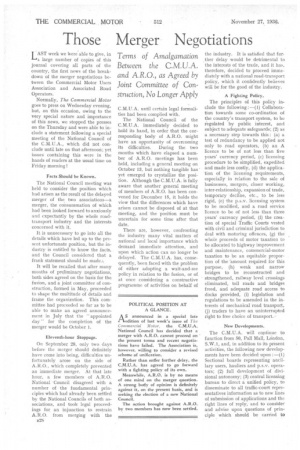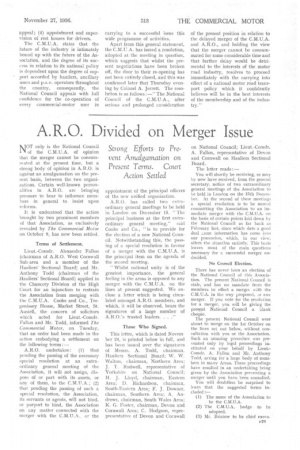Those Merger Negotiations
Page 38

Page 39

If you've noticed an error in this article please click here to report it so we can fix it.
LAST week we vere able to give, in a large number of copies of this journal covering all parts of the country, the first news of the breakdown of the merger negotiations between the Commercial Motor Users Association and Associated Road Operators.
Normally, The Commercial Motor goes to press on Wednesday evening, but, on this occasion, owing to the very special nature and importance of this news, we stopped the presses on the Thursday and were able to include a statement following a special meeting of the National Council of the C.M.U.A., which did not conclude until late on that afternoon; yet issues containing this were in the hands of readers at the usual time on Friday morning I
Facts Should be Known.
The National Council meeting was held to consider the position which had arisen as the result of the delayed merger of the two associations—a merger, the consummation of which had been looked forward to anxiously and expectantly by the whole roadtransport industry and the interests concerned with it.
It is unnecessary to go into all the details which have led up to the present unfortunate position, but the industry is entitled to know the facts, and the Council considered that a frank statement should be madea
It will be recalled that after many months of preliminary negotiations, both sides agreed on the basis for the fusion, and a joint committee of construction, formed in May, proceeded to shape the multitude of details and frame the organization. This committee had proceeded so far as to be able to make an agreed announcement in July that the "appointed day" for the completion of •the merger would be October 1.
Eleventh-hour Stoppage.
On September 28, only two days before the merger should definitely have conic into being, difficulties unfortunately arose on the side of A.R.O., which completely prevented an immediate merger. At that late hour, a few •members of A.R.O. National .Council disagreed with a number of the fundamental principles which had already been settled by the National Councils of both associations, and took legal proceedings for an injunction to restrain A.R.O. from merging with the
o2S C.M.U.A. until certain legal formalities had been complied with.
The National Council of the C.M.U.A. immediately decided to holdits hand, in order that the corresponding body of A.R.O. might have an opportunity of overcoming its difficulties. During the two months which have elapsed a number of A.R.O. meetings has been held, including a general meeting on October 13, but nothing tangible has yet emerged to crystallize the position. Although the C.M.U.A. is fully aware that another general meeting of members of A.R.O. has been convened for December 15, it holds the view that the differences which have arisen cannot be disposed of at that meeting, and the position must be uncertain for some time after that date.
There are, however, confronting the industry many vital matters of national and local importance which demand immediate attention, and. upon which action can no longer be delayed. The C.M.U.A. has, consequently, been faced with the problem of either adopting a wait-and-see policy in relation to the fusion, or of at once considering a constructive programme of activities on behalf of the industry. It is satisfied that fur. flier delay would be detrimental to the interests of the trade, and it has, therefore, decided to proceed immediately with a national road-transport policy, which it confidently believes will be for the good of the industry.
A Fighting Policy.
The principles of this policy include the following :—(1) Collaboration towards some co-ordination of the country's transport system, to be regulated by public interest, and subject to adequate safeguards; (2) as a necessary step towards this : (a) a test of redundancy to be applied not only to road operators, (b) an A licence to be of not less than 'five years' currency period, (c) licensing procedure to be simplified, expedited and made less costly, (d) the application of the licensing requirements, especially in relation to the sale of businesses, mergers, closer working, inter-relationship, expansion of trade, temporary decrine, etc., to be less rigid, (e) the p.s.v. licensing system to be modified, and a road service licence to be of not less than three years' currency period, (f) the creation of special Traffic Courts vested with civil and criminal jurisdiction to deal with motoring offences, (g) the whole proceeds of motor taxation to be allocated to highway improvement and maintenance, commercial-motor taxation to be an equitable proportion of the 'amount required for this purpose,(h) weak and narrow bridges to be reconstructed and strengthened, railway level crossings eliminated, toll roads and bridges freed, and adequate roadaccess to docks provided, (i) legislation and regulations to be amended in the interests of mechanical road transport, (j) traders to have an uninterrupted right to free choice of transport.,
New Developments.
The C.M.U.A. will continue to function from 50, Pall Mall, LOndon, S.W.1, and, in addition to its present activities, the following new developments have been decidedupon :—(1) Sectional boards representing ancillary users, hauliers and p.s.v. operators; (2) full development of divisional autonomy; (3) central licensing bureau to direct a unified policy, to disseminate to all traffic-court representatives information as to new lines of submission of applications and the right lines of reply, and to consider and advise upon questions of principle which should be carried to appeal ; (4) appointment and supervision of rest houses for drivers.
The C.M.U.A. states that the future of the industry is intimately bound up with the future of the Association, and the degree of its success in relation to its national policy is dependent upon the degree of support accorded by hauliers, ancillary users and p.s.v. operators throughout the country, consequently, the National Council appeals with full confidence for the co-operation of every commercial-motor user in carrying to a successful issue this wide programme of activities.
Apart from this general statement, the C.M.U.A. has issued a resolution, adopted at the meeting in question, which suggests that whilst the present negotiations have been broken off, the door to their re-opening has not been entirely closed, and this was confirmed later that Thursday evening by Colonel A. jerrett. The resolution is as follows :—" The National Council of the C.M.U.A., after serious and prolonged consideration of the present position in relation to the delayed merger of the C.M.U.A. and A.R.O., and holding the view that the merger cannot be consummated for some considerable time and that further delay would be detrimental to the interests of the motor road industry, resolves to proceed immediately with the carrying into effect of a national motor road transport policy which it confidently believes will be in the best interests of the membership and of the industry."




















































































